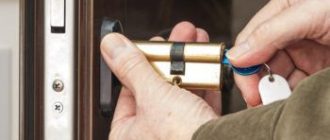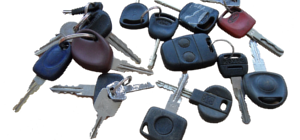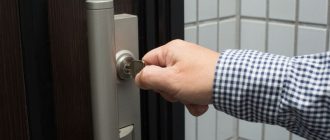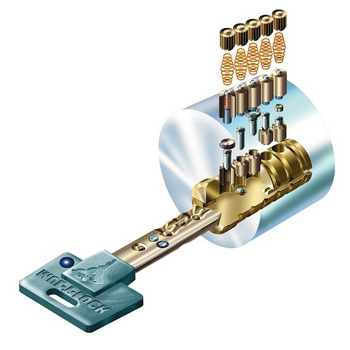
What is rekeying and when do you need it
Rekeying is a process that involves changing the lock pins within a lock cylinder, rendering the previous key useless. It is done to enhance security and provide a new key that can open the same lock. Rekeying is often a more cost-effective solution compared to completely replacing the entire lock mechanism.
So when do you need rekeying? There are several situations where rekeying is necessary. One common scenario is when you move into a new home or office space. You never know who might have a copy of the old key, so rekeying the locks provides peace of mind and ensures that only you and those you trust have access to your property.
In addition to moving into a new space, rekeying is also recommended if you lose your keys or if they are stolen. By rekeying the locks, you eliminate the risk of a stranger gaining unauthorized access to your property. It is a proactive measure that ensures the security of your home or business.
Understanding Rekeying and Its Importance
Rekeying is the process of changing the pins or tumblers inside a lock cylinder so that new keys are needed to operate it. It is an essential security measure for both residential and commercial properties.
When you move into a new home or office space, it’s important to consider rekeying the locks to ensure that you are the only one with access. Similarly, if you lose a key or have an employee leave your company, rekeying is necessary to maintain security.
Rekeying is not only important for security reasons but also for convenience. When you have multiple locks that are rekeyed to use the same key, it eliminates the need to carry around a large number of keys. This is especially beneficial for property owners or managers who need to access different areas.
Furthermore, rekeying allows you to have better control over your property. By rekeying the locks, you can have a master key that grants you access to all areas while providing individual keys to employees or tenants for their respective spaces. This way, you can limit access to certain areas and ensure that only authorized individuals can enter them.
In summary, rekeying is a crucial process in maintaining the security and convenience of your property. Whether you are moving into a new space or need to make changes to your existing locks, it’s important to understand the importance of rekeying and when it is necessary.
What Does Rekeying Mean?
Rekeying refers to the process of changing the combination or code of a lock. It involves adjusting the lock mechanism so that a new key is needed to unlock it. This can be done by a professional locksmith using special tools and techniques.
When you need rekeying, it is usually when you want to prevent unauthorized access to your property. For example, if you have lost your keys or if you have moved into a new home, rekeying the locks can give you peace of mind knowing that only you have the keys to your property.
Rekeying can also be beneficial in situations where you want to limit access to certain areas of your property. For instance, if you have recently fired an employee who had access to certain rooms or if you have had a tenant move out of a rental property, rekeying the locks can ensure that they no longer have access.
Overall, rekeying provides an extra layer of security for your property. It can help prevent unauthorized entry and give you control over who has access to your space. Whether you have moved into a new home, lost your keys, or want to restrict access, rekeying is a practical solution that can meet your needs.
When Should You Consider Rekeying?
If you’ve just moved into a new home or office, or if you’ve lost track of who has keys to your current locks, you may need to consider rekeying. Rekeying is the process of changing the internal pins and springs of a lock cylinder so that it can be operated by a new key. This is a more cost-effective option than completely replacing the locks.
In addition to moving into a new space or losing track of keys, there are a few other situations in which rekeying may be necessary. If you’ve experienced a break-in or an attempted break-in, it’s important to rekey your locks to ensure that the intruder no longer has access. Similarly, if you’ve recently fired an employee or ended a romantic relationship with someone who had access to your property, rekeying is a crucial step in maintaining security.
Rekeying is also recommended when a lock becomes worn or damaged. Over time, the internal components of a lock can wear down, making it easier for the lock to be picked or for the key to break off inside. In these situations, rekeying can help restore the lock’s functionality and security.
Ultimately, the decision to rekey should be based on your specific needs and circumstances. If you’re unsure whether rekeying is necessary, it’s always a good idea to consult with a professional locksmith who can assess your situation and provide guidance.
Rekeying vs. Lock Replacement
When considering the security needs of your home or business, it is important to understand the differences between rekeying and lock replacement. Both options serve the purpose of changing the lock on a door, but they have distinct advantages and considerations.
| Rekeying involves changing the internal workings of a lock so that a new key is required to open it. The locksmith will remove the lock cylinder and replace the pins and springs inside, creating a new key combination. | Lock replacement involves removing the entire lock and installing a completely new lock mechanism. This means that a new set of keys will be required to open the door. |
| Rekeying is a more cost-effective option compared to lock replacement. It does not require purchasing a new lock and can be done quickly by a professional locksmith. | Lock replacement provides a higher level of security compared to rekeying. If you have concerns about the integrity of your old lock or want to upgrade to a more advanced security system, lock replacement is the recommended option. |
| Rekeying is commonly recommended when you move into a new home or office space, as it allows you to ensure that you have exclusive access to the property by changing the key combination. | Lock replacement may be necessary if your current lock is damaged, worn out, or compromised in any way. It is also a good option if you want to upgrade to a lock with additional features, such as a digital keypad. |
| Rekeying is a relatively simple process that can be completed on-site by a professional locksmith. It requires minimal hardware and takes less time compared to lock replacement. | Lock replacement is a more involved process that may require more time and resources. It may involve drilling new holes for the lock hardware and ensuring that the new lock is properly aligned. |
Ultimately, the choice between rekeying and lock replacement depends on your specific needs and circumstances. If you are unsure which option is best for you, it is recommended to consult with a professional locksmith who can assess your situation and provide personalized recommendations.
How Does Rekeying Work?
Rekeying is the process of modifying the existing lock in order to work with a new key. It involves changing the internal components of the lock cylinder so that the old key will no longer function, and the new key will be able to open and close the lock.
When you need to rekey a lock, it is important to understand how the process works. Here is a step-by-step guide:
- Remove the lock cylinder from the door. This is usually done by unscrewing a small set screw or by removing the mounting screws.
- Take out the plug from the lock cylinder. The plug is the part of the lock that the key inserts into.
- Remove the old bottom pins and top pins from the plug. These pins are what interact with the key to unlock the lock.
- Replace the old pins with new ones that match the cuts of the new key.
- Reassemble the lock cylinder by putting the plug back into the cylinder and securing it in place.
- Test the new key to ensure that it opens and closes the lock smoothly.
Rekeying is a cost-effective solution when you need to change the keys for your locks but don’t want to replace the entire lock. It is commonly done when moving into a new home, when keys are lost or stolen, or when you want to limit access to certain areas of your property.
Overall, rekeying allows you to maintain the security of your property while providing you with a new set of keys that you have control over.
The Benefits of Rekeying
Rekeying your locks can provide various benefits depending on your specific needs. Here are a few key advantages of opting for rekeying:
- Enhanced Security: Rekeying allows you to change the keys to your locks without replacing the entire lockset. This means that if you have lost your keys or suspect that they have been compromised, rekeying is a cost-effective way to maintain the security of your property.
- Cost Savings: Rekeying is typically more affordable than replacing all of your locks. This is particularly beneficial if you have multiple locks on your property that need to be rekeyed.
- Convenience: Instead of carrying multiple keys for different locks, rekeying allows you to use a single key for all of your locks. This makes it easier to access your property and eliminates the need to carry a large keyring.
- Quick Process: Rekeying is a relatively quick process that can be completed by a professional locksmith. This means that you can regain access to your property without significant downtime or inconvenience.
- Peace of Mind: Rekeying your locks provides peace of mind, knowing that you have control over who has access to your property. By changing the keys, you can ensure that only authorized individuals can enter your premises.
Overall, rekeying offers a cost-effective and convenient solution to enhance the security of your property without the need for a complete lock replacement. It is a recommended option when you need to change the key for your locks but do not necessarily require new locksets.
Choosing a Professional Locksmith for Rekeying
When it comes to rekeying a lock, it’s important to choose a professional locksmith who has the expertise and experience to get the job done right. Rekeying involves altering the configuration of the lock’s pins and tumblers so that a different key can operate it.
To ensure that the rekeying process is completed correctly, it’s essential to find a locksmith who specializes in this service. They will know the ins and outs of the lock and key system and will have the necessary tools to perform the rekeying without damaging the lock.
One way to assess the professionalism of a locksmith is to check their credentials and certifications. Look for a locksmith who is licensed and insured, as this demonstrates their commitment to their craft and their clients’ security.
Another factor to consider when choosing a locksmith for rekeying is their reputation. Read reviews and testimonials from previous clients to get an idea of their level of expertise and customer service. A reputable locksmith should have a track record of providing excellent service and satisfying their customers.
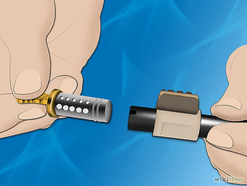
Additionally, it’s crucial to find a locksmith who offers transparent pricing. They should provide a clear breakdown of the costs involved and avoid any hidden fees. This will help you make an informed decision and avoid any surprises when it comes time to pay.
Lastly, consider the locksmith’s availability and response time. Emergencies can happen at any time, so it’s important to choose a locksmith who offers 24/7 service. They should be able to respond quickly and efficiently to your rekeying needs.
In conclusion, when you need rekeying services, it’s crucial to choose a professional locksmith who has the necessary expertise, credentials, and reputation. By doing so, you can ensure that your locks are rekeyed properly, providing you with the security and peace of mind you need.
Factors Affecting the Cost of Rekeying
When it comes to rekeying, the cost can vary depending on several factors. Here are some of the key factors that can affect the cost of rekeying:
- The number of locks: The cost of rekeying will primarily depend on the number of locks that need to be rekeyed. The more locks you have, the higher the cost will be.
- The complexity of the lock: Certain locks can be more complex and require more time and expertise to rekey. High-security locks or specialty locks may cost more to rekey compared to standard locks.
- The location: The location where the rekeying service is being provided can also impact the cost. In urban areas or areas with higher cost of living, the rekeying service may be more expensive compared to rural areas.
- The type of key system: Rekeying a basic key system will generally be less expensive compared to rekeying a master key system or a key system that requires more complex programming.
- Additional services: If you require additional services along with rekeying, such as lock repairs or replacement of broken locks, the cost will increase accordingly.
- Urgency of the service: If you need rekeying services urgently, such as during an emergency situation, the cost may be higher due to the need for immediate response and prioritization.
It’s important to consider these factors when estimating the cost of rekeying. It’s recommended to contact a professional locksmith to obtain an accurate quote based on your specific requirements.
Rekeying Residential Properties
Rekeying residential properties is a necessary task that homeowners might need to consider at some point. Rekeying involves changing the lock pins and tumblers of a lock, rendering the old keys useless and requiring new keys to operate the lock.
There are several situations where rekeying a residential property is necessary. One common situation is when homeowners move into a new house. In this case, it is crucial to rekey the locks to ensure that previous owners, tenants, or anyone who has access to the old keys cannot enter the property. Rekeying provides peace of mind and enhances security for the new homeowners.
Another situation where rekeying is needed is when keys are lost or stolen. Losing a key or having it stolen poses a significant security risk since unauthorized individuals may gain access to the property. Rekeying the locks ensures that the lost or stolen keys are no longer usable, preventing potential break-ins or unauthorized entry.
Additionally, if homeowners have multiple locks throughout their property, rekeying can be a practical solution. Rekeying allows homeowners to have a single key that can operate all locks, eliminating the need to carry multiple keys.
Rekeying residential properties should be done by a professional locksmith who has the knowledge and skills to perform the task accurately. Hiring a professional ensures that the process is done efficiently, minimizing any potential errors that could compromise the security of the property.
Overall, rekeying residential properties is a necessary step to maintain security and control over who has access to a property. Whether moving into a new house, losing keys, or wanting the convenience of a single key for multiple locks, rekeying provides an effective solution. By seeking the help of a professional locksmith, homeowners can ensure a smooth and secure rekeying process.
Rekeying Commercial Properties
When it comes to commercial properties, the security of your building should always be a top priority. One important aspect of maintaining security is ensuring that only authorized personnel have access to your property. This is where rekeying can be extremely beneficial.
Rekeying a commercial property involves changing the locks so that new keys are required to gain entry. This can be necessary in a variety of situations. For example, if an employee with access to your property leaves the company, it is essential to rekey the locks to prevent unauthorized access.
In addition to employee turnover, there may be other instances where rekeying is necessary. If you have recently acquired a new commercial property, it is wise to rekey all of the locks to ensure that previous owners or tenants no longer have access. This will give you peace of mind knowing that you are the only one with keys to your property.
Another scenario where rekeying commercial properties makes sense is after a security breach or a break-in. If there has been a breach of your property’s security, it is crucial to take immediate action. One of the first steps should be rekeying the locks to prevent any further unauthorized access.
Rekeying commercial properties is a cost-effective way to enhance the security of your building without completely replacing all of the locks. By changing the lock cylinders and issuing new keys, you can ensure that only authorized individuals have access to your property.
Overall, rekeying commercial properties is an important security measure that should not be overlooked. It is a proactive step that can help prevent unauthorized access and keep your business and assets safe.
Rekeying Automotive Locks
When it comes to automotive locks, rekeying is a service that you might need in certain situations. Rekeying automotive locks involves changing the internal pins and springs of the lock cylinder to fit a new key, rendering the old key useless.
There are several reasons why you might need to rekey your automotive locks. One common scenario is if you have lost your keys or they have been stolen. In such cases, rekeying the locks is crucial to ensure the security of your vehicle.
Another situation where rekeying automotive locks is necessary is when you purchase a used car. You never know who has copies of the old keys, so it’s best to rekey the locks to have peace of mind that only you have access to your vehicle.
It’s also recommended to rekey your automotive locks if you’ve had a break-in attempt or if your keys have been compromised in any way. By changing the lock cylinder and getting a new key, you eliminate the risk of someone being able to use the old key to gain access to your car.
Overall, rekeying automotive locks is an essential service that can provide enhanced security and peace of mind for vehicle owners. Whether you’ve lost your keys, purchased a used car, or want to upgrade your security, rekeying your automotive locks ensures that only you have access to your vehicle.
Rekeying High-Security Locks
When it comes to high-security locks, the need for rekeying can arise for a variety of reasons. Whether it’s due to lost keys, employee turnover, or concerns about unauthorized access, rekeying is an essential step in maintaining the security of your premises.
High-security locks, also known as pick-resistant locks, are designed with advanced features to deter and prevent unauthorized entry. They often incorporate complex mechanisms and keyways that make them more resistant to picking, bumping, and drilling.
However, even with their enhanced security features, high-security locks are not immune to the need for rekeying. In fact, their complexity can make it even more crucial to rekey them when necessary.
One of the main reasons you may need to rekey high-security locks is the loss or theft of keys. If anyone gains unauthorized possession of a key, it can compromise the security of your premises. Rekeying the locks ensures that the old keys will no longer work, providing peace of mind and enhancing the security of your property.
Additionally, rekeying is essential when there is employee turnover. As employees leave your organization, it’s crucial to rekey the locks to prevent any potential unauthorized access. This is particularly important for businesses that handle sensitive information or valuable assets.
Another situation where rekeying high-security locks is necessary is when there are concerns about the integrity of the lock. For example, if you suspect that someone may have tampered with the lock or attempted to pick it, rekeying can help restore the security of the lock.
Overall, rekeying high-security locks is an important step in maintaining the security of your premises. It provides an added layer of protection against unauthorized access and ensures that only authorized individuals can gain entry.
In conclusion, whether it’s due to lost keys, employee turnover, or concerns about the integrity of the lock, rekeying high-security locks is a necessary measure to enhance security and prevent unauthorized access to your property.
Rekeying for Rental Properties
Rekeying is a process that involves changing the lock on a property to work with a new set of keys. It is a necessary step for rental properties in order to ensure the safety and security of both the landlord and the tenants.
There are several reasons why rekeying is needed for rental properties. First and foremost, it provides peace of mind to the landlord, knowing that they have complete control over who has access to their property. When a tenant moves out, rekeying the locks ensures that the previous tenant no longer has a way to enter the property.
Additionally, rekeying is important for the safety of the new tenants. Even if the previous tenant returned all the keys, there is always a risk that they made an extra copy or shared them with someone else. By rekeying the locks, the landlord can be certain that the new tenants are the only ones with access to the property.
Rekeying can also be necessary if a key is lost or stolen. The landlord can quickly and easily change the locks to prevent unauthorized access to the rental property. This is especially important in situations where the lost or stolen key could potentially compromise the security of the property.
In summary, rekeying is a crucial step for rental properties. It allows the landlord to maintain control over access to the property and ensures the safety and security of both the landlord and the tenants. Whether due to a tenant moving out or a lost key, rekeying provides peace of mind and helps to maintain a safe living environment.
Rekeying for Newly Purchased Properties
When purchasing a new property, one of the first things you need to consider is rekeying the locks. Rekeying is the process of changing the lock pins so that the old keys will no longer work. This is important for the security of your new property, as you never know who may have access to the old keys.
Rekeying is especially crucial for newly purchased properties because you don’t know how many copies of the old keys are still out there. Previous owners may have given spare keys to neighbors, friends, or even contractors. By rekeying the locks, you can ensure that only you and those you trust have access to your new property.
Not only does rekeying provide added security, but it also gives you peace of mind. Knowing that you are the only one with the keys to your new property can help you feel more comfortable and secure in your new space.
If you’re unsure whether you need to rekey your newly purchased property, it’s always best to err on the side of caution. It’s better to be safe than sorry when it comes to the security of your home or business. Contact a professional locksmith to assess your locks and provide guidance on the best course of action.
In conclusion, rekeying is essential for newly purchased properties to ensure your safety and security. Don’t underestimate the importance of this simple yet effective security measure. Take the necessary steps to protect yourself and your property by scheduling a rekeying service as soon as possible.
Q&A:
What is rekeying and why is it important?
Rekeying is the process of changing the locks of a property so that the old keys will no longer work. It is important because it provides security and peace of mind, especially in situations where there may be lost or stolen keys, or when you move into a new property.
How does rekeying work?
Rekeying involves changing the configuration of the lock so that it will only work with a new set of keys. This is typically done by a locksmith who will disassemble the lock, replace the pins inside with new ones, and create a new set of keys that match the new configuration.
When should I consider rekeying my locks?
There are several situations when you should consider rekeying your locks. These include moving into a new property, experiencing a break-in, losing your keys, or if you suspect that someone unauthorized has access to your keys. It’s always better to be safe than sorry when it comes to your security.
Do I need to hire a professional locksmith to rekey my locks?
While it is possible to attempt rekeying your locks yourself, it is highly recommended to hire a professional locksmith. They have the knowledge, experience, and tools necessary to properly rekey your locks without causing any damage. It’s worth the investment to ensure the job is done correctly.
How much does rekeying a lock typically cost?
The cost of rekeying a lock can vary depending on several factors, including the type of lock, the number of locks being rekeyed, and the location of the property. On average, you can expect to pay between $50 and $150 per lock. It’s always a good idea to get multiple quotes from different locksmiths to compare prices.

